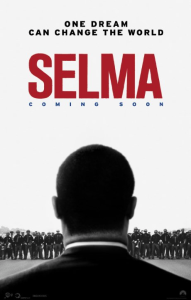
SteveMcCabe.net...
...being the online presence of Steve McCabe himself
On Selma, and hard stories
January 11th, 2015Selma is not a film about Martin Luther King. King does, to be sure, feature prominently, but this is the story of a particular event in the history of the American civil rights movement. King was a major player in that movement, but this is a story about events, not players. And it’s an ugly, nasty story, but one that needed telling, and one that Ava DuVernay has told with clarity, honesty and power.
The film charts the events that led to two marches to promote voter registration among the black community of Selma, a small town in Alabama, in 1965. King is played by David Oyelowo, a British actor who does a magnificent job of recreating King’s oratory — or, at the very least, a close approximation; King’s estate hold the copyright to his speeches, and jealously guard their rights. Oyelowo shines especially in the set-piece scenes, the church speeches, the courthouse-steps speeches, where delivers his lines with a passion that becomes almost musical. He also presents, in the more intimate scenes, a vulnerable side to King that’s rarely contemplated in most American depictions of King, which paint a picture of a myth, more than of a man, shying away from the behind-the-scenes deliberations with his lieutentants which reveal a human, conflicted man who experienced doubt. Selma is even bold enough to address the issue of King’s infidelity, a subject that Coretta Scott King, played wonderfully by Carmen Ejogo, broaches once, briefly. This is not a film about King, but he is a central character — possibly the central character — and it depicts him, honestly, avoiding the hagiography that attends the man in most American discourse. It’s a little jarring, indeed, to hear him addressed, even by his wife or his confidantes, simply as “Martin.” To the extent that Selma is about King, it offers a rounded, rich picture of him.
Tom Wilkinson plays Lyndon Johnson as somewhere between the man himself and Ronald Reagan, but the film does risk whitewashing his role in the civil rights movement, presenting him as a willing supporter of the black cause who wishes he could do more but whose hands are tied by Congress. Less attractively portrayed is George Wallace, portrayed as a whiney little toady with a pleasing odiousness that manages to stay out of cartoon-villain territory by Tim Roth (why, incidentally, did it take this many British actors to tell so very American a story?).
The events of the Selma to Montgomery marches have been well-enough documented that there’s no need to detail the events in great depth. But it must be said that DuVernay tells the story powerfully. The first march ended in horrific violence, and DuVernay shows it unflinchingly. DuVernay slightly overuses the standard view of King as speaker, the back of his head filling most of the frame with his audience visible in the distance, but overall her direction is outstanding. She takes a story full of the most unbearable attrocities — a church bombing early in the film is quite shocking — and manages to find humour, in particular in an early scene that sees Annie Lee Cooper, played by a slightly incongruous Oprah Winfrey (Harpo Productions were behind the making of the film, so I suppose we can find room for her), being denied voter registration once again, this time, even though she could recite the preamble to the US Constitution, for being unable to name all the judges in the county.
This is not an easy film to watch. But it is fascinating. The cast — with Oyelowo and Ejogo as standouts — are superb, and the story is one that needs to be told. Award nomination, at time of writing, have not been announced. But expect to see Selma, and its two leads, feature prominently. DuVernay has made a film that is likely to be awarded quite extensively, without it simply being Oscar-bait.

Leave a Reply